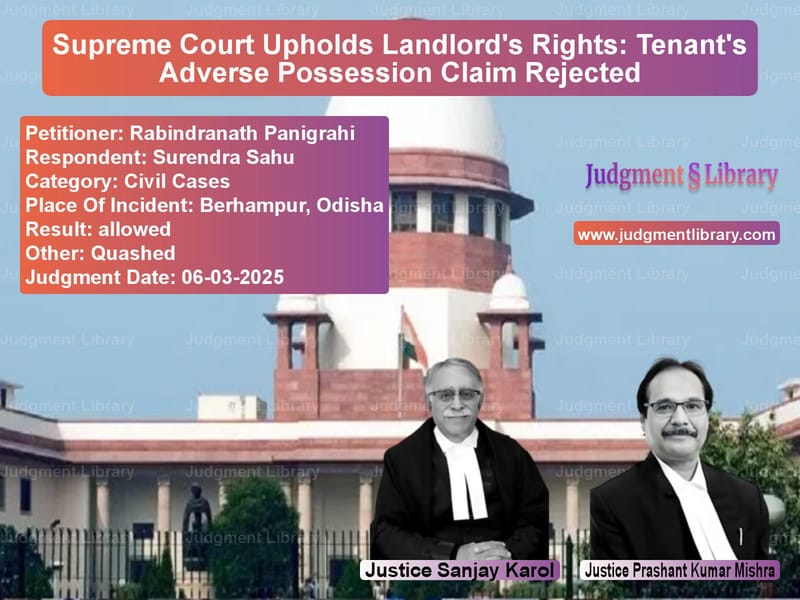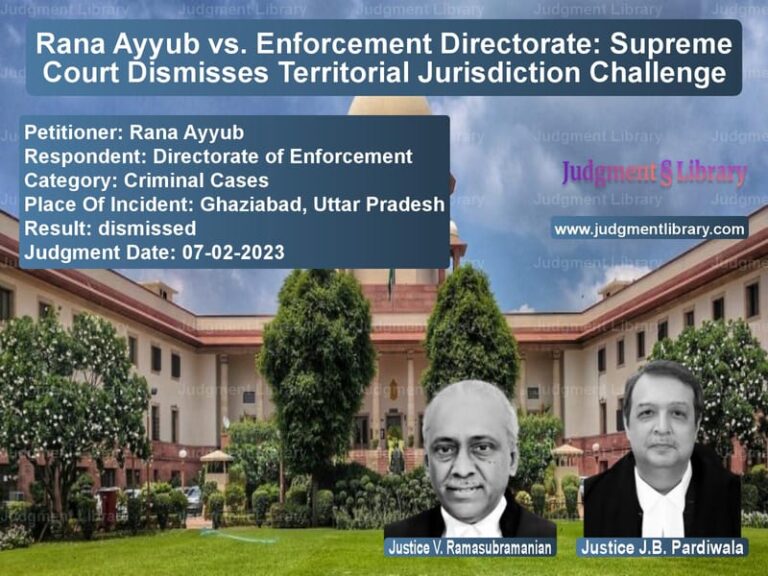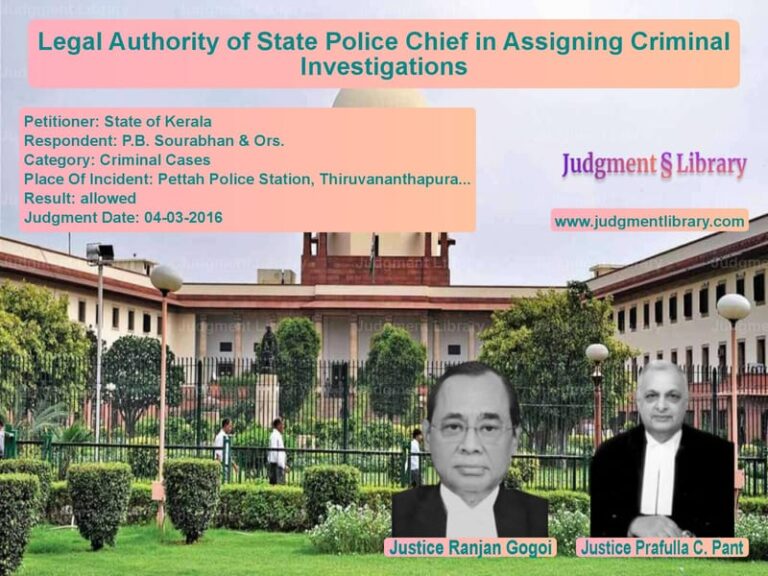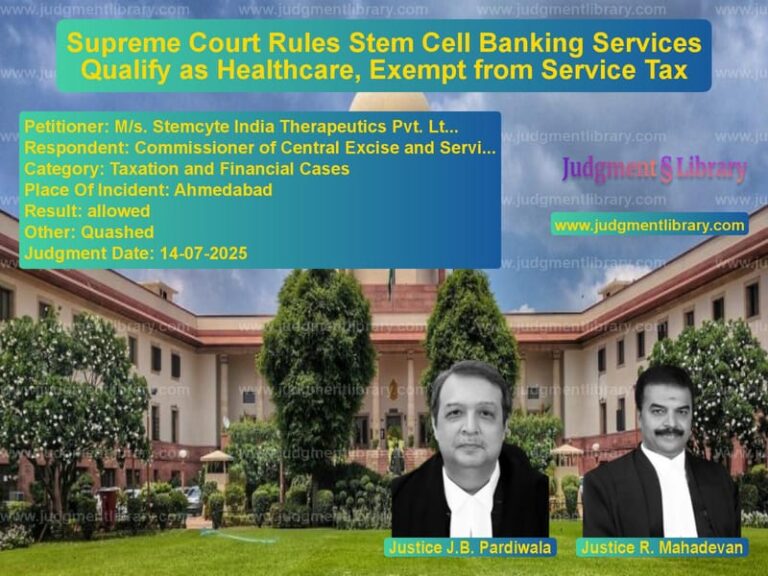Supreme Court Upholds Landlord’s Rights: Tenant’s Adverse Possession Claim Rejected
The Supreme Court of India, in the case of Rabindranath Panigrahi v. Surendra Sahu, delivered a crucial ruling clarifying the rights of landlords and tenants while addressing the doctrine of adverse possession. The judgment set aside an order of the Orissa High Court and upheld the landlord’s right to evict the tenant, rejecting claims of ownership through adverse possession.
Background of the Case
The dispute centered on two shop rooms located in the compound of Madhu Mandir, Berhampur, Odisha. The appellant, Rabindranath Panigrahi, claimed ownership of the property as the legally adopted son of the late Smt. Ashalata Devi. The respondent, Surendra Sahu, was occupying the premises as a tenant since 1974. The conflict arose when the tenant refused to pay rent and later claimed ownership based on adverse possession.
Key Issues
- Whether the appellant had the legal right to evict the tenant.
- Whether the respondent could claim ownership of the property through adverse possession.
- Whether the Orissa High Court had erred in reversing the concurrent findings of the lower courts.
Petitioner’s (Landlord’s) Arguments
- The appellant was the legally adopted son of Ashalata Devi and had inherited the property.
- The respondent was given possession as a tenant in 1974 at a rent of ₹1,000 per month.
- From July 2001, the respondent stopped paying rent and became a defaulter.
- A legal notice was sent on January 27, 2003, terminating the tenancy, but the tenant refused to vacate.
- The tenant falsely claimed that he had obtained the property through an oral gift.
Respondent’s (Tenant’s) Arguments
- The respondent denied any landlord-tenant relationship with the appellant.
- He claimed that he had acquired the property through an oral gift from Ashalata Devi.
- He further claimed that he had been in possession of the property for decades and had acquired ownership through adverse possession.
Trial Court’s Decision
The Civil Judge (Senior Division), Berhampur, ruled in favor of the landlord, holding that:
- The appellant was the legal owner of the property.
- The tenant failed to prove that he had acquired ownership through an oral gift.
- The tenant’s possession was permissive in nature and could not be considered adverse possession.
- As a tenant, the respondent was obligated to vacate the premises.
- The tenant was directed to clear arrears of rent and pay damages for unauthorized occupation.
First Appellate Court’s Decision
The 1st Additional District Judge, Berhampur, dismissed the appeal and upheld the Trial Court’s findings, affirming that:
- The respondent was a tenant and could not claim ownership.
- His possession was initially permissive, and he failed to prove hostile possession to claim adverse ownership.
- The respondent failed to establish a legal transfer of ownership in his favor.
Orissa High Court’s Decision
The respondent moved the Orissa High Court, which reversed the findings of the lower courts, ruling that:
- The Trial Court had incorrectly assumed a landlord-tenant relationship based on circumstantial evidence.
- The appellant failed to prove beyond doubt that the respondent was his tenant.
- Since there was no registered lease agreement, the appellant could not seek eviction under tenancy laws.
- The matter should have been pursued as a title suit rather than an eviction suit.
Supreme Court’s Observations
The Supreme Court strongly criticized the High Court for overturning concurrent factual findings. It reaffirmed several key legal principles:
1. Landlord-Tenant Relationship
The Court noted:
“The evidence on record clearly establishes that the respondent entered possession as a tenant in 1974. The lack of a formal lease agreement does not negate the existence of a landlord-tenant relationship, especially when possession was permissive.”
2. Adverse Possession Claim Rejected
The Court rejected the tenant’s claim of adverse possession, holding:
“Permissive possession does not become adverse possession unless the tenant explicitly repudiates the landlord’s ownership to his knowledge and remains in open, hostile, and continuous possession for the statutory period. Mere long possession is insufficient to claim adverse ownership.”
3. High Court’s Jurisdictional Error
The Court ruled that the High Court had exceeded its authority under Section 100 CPC by interfering with concurrent findings of fact:
“Second appeals can only be entertained on substantial questions of law. The findings of the Trial Court and the First Appellate Court were based on proper appreciation of evidence and could not be disturbed in a second appeal.”
Final Judgment
The Supreme Court set aside the High Court’s ruling and restored the decisions of the lower courts. It directed:
- The respondent must vacate the premises within three months.
- He must clear all dues, including arrears of rent and electricity charges.
- The Registrar General of the Orissa High Court must ensure compliance with the order.
Key Takeaways from the Judgment
- Adverse possession claims require clear evidence of hostile ownership. Mere long possession is insufficient.
- A formal lease agreement is not always necessary to prove a landlord-tenant relationship.
- High Courts cannot overturn concurrent factual findings in second appeals unless there is a substantial question of law.
- Tenants must vacate premises upon termination of tenancy and cannot claim ownership without legal transfer.
Conclusion
The Supreme Court’s judgment in Rabindranath Panigrahi v. Surendra Sahu reaffirms fundamental property law principles and prevents unlawful claims of ownership by tenants. By rejecting the doctrine of adverse possession in a tenancy dispute, the ruling upholds landlords’ rights and ensures that illegal occupants cannot misuse legal loopholes to remain in possession indefinitely.
Petitioner Name: Rabindranath Panigrahi.Respondent Name: Surendra Sahu.Judgment By: Justice Sanjay Karol, Justice Prashant Kumar Mishra.Place Of Incident: Berhampur, Odisha.Judgment Date: 06-03-2025.
Don’t miss out on the full details! Download the complete judgment in PDF format below and gain valuable insights instantly!
Download Judgment: rabindranath-panigra-vs-surendra-sahu-supreme-court-of-india-judgment-dated-06-03-2025.pdf
Directly Download Judgment: Directly download this Judgment
See all petitions in Property Disputes
See all petitions in Landlord-Tenant Disputes
See all petitions in Specific Performance
See all petitions in Damages and Compensation
See all petitions in Judgment by Sanjay Karol
See all petitions in Judgment by Prashant Kumar Mishra
See all petitions in allowed
See all petitions in Quashed
See all petitions in supreme court of India judgments March 2025
See all petitions in 2025 judgments
See all posts in Civil Cases Category
See all allowed petitions in Civil Cases Category
See all Dismissed petitions in Civil Cases Category
See all partially allowed petitions in Civil Cases Category







